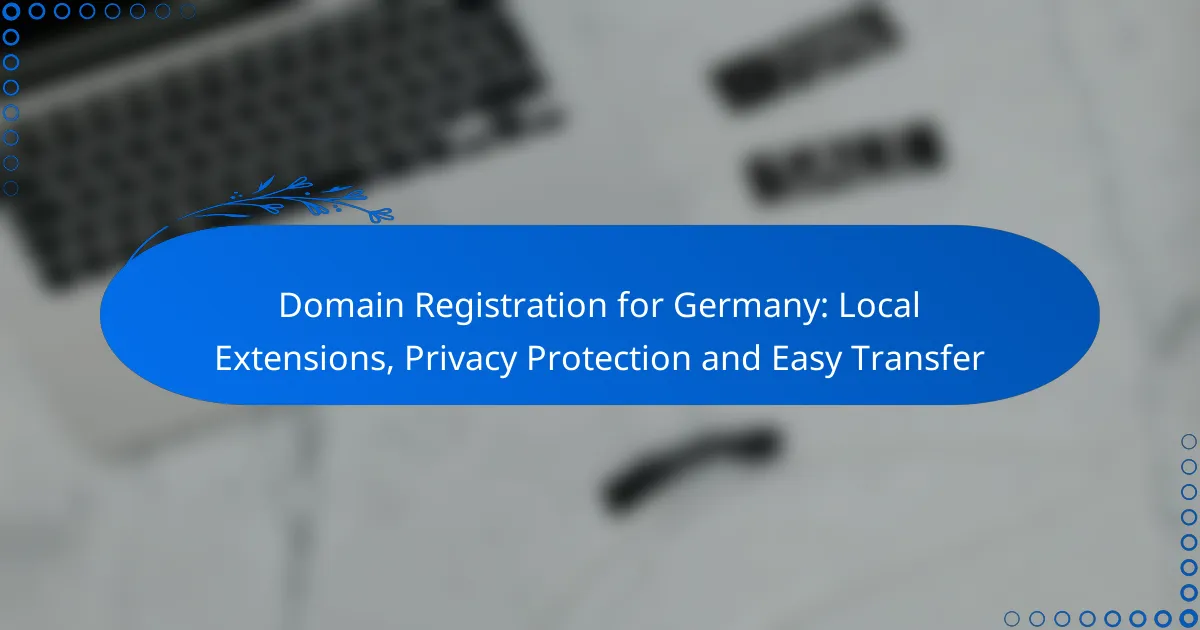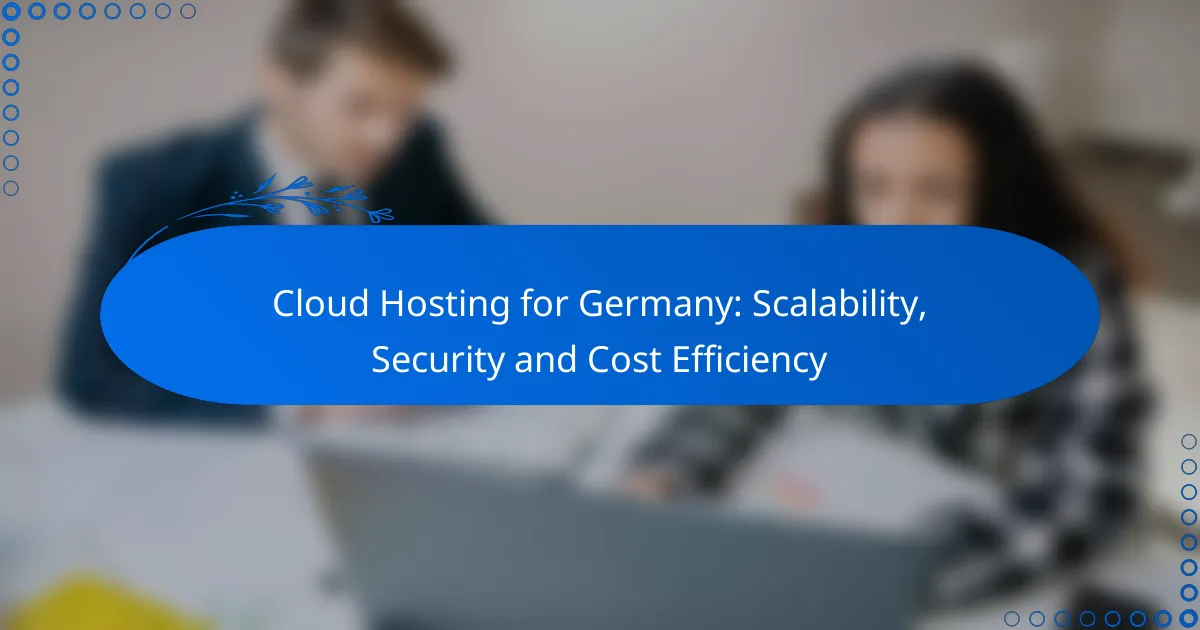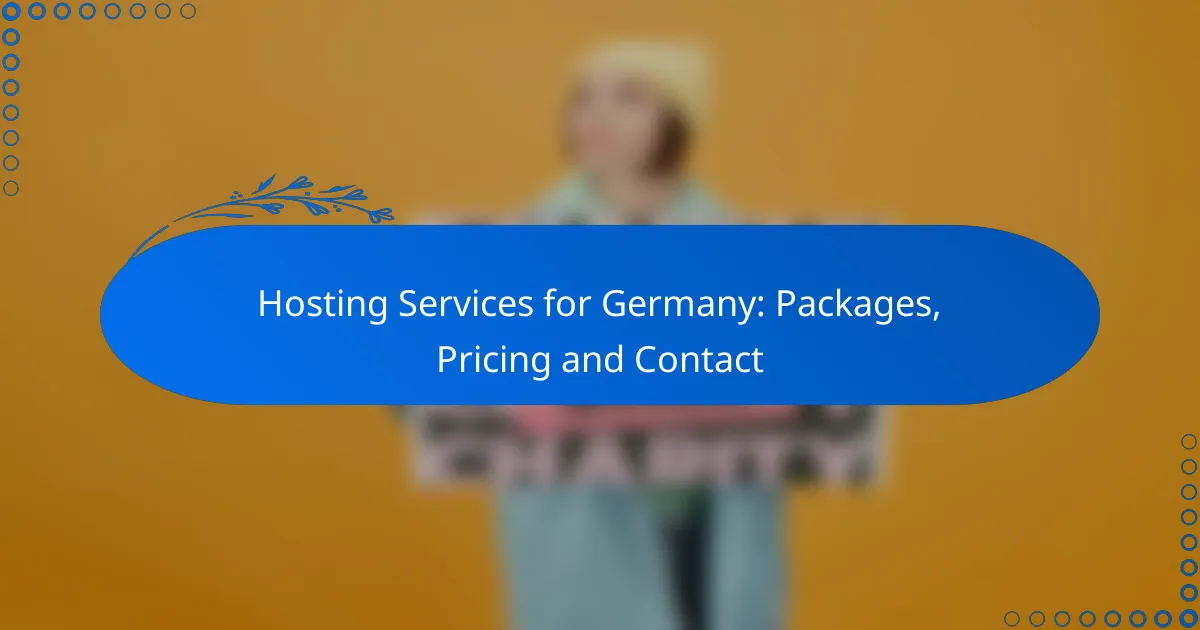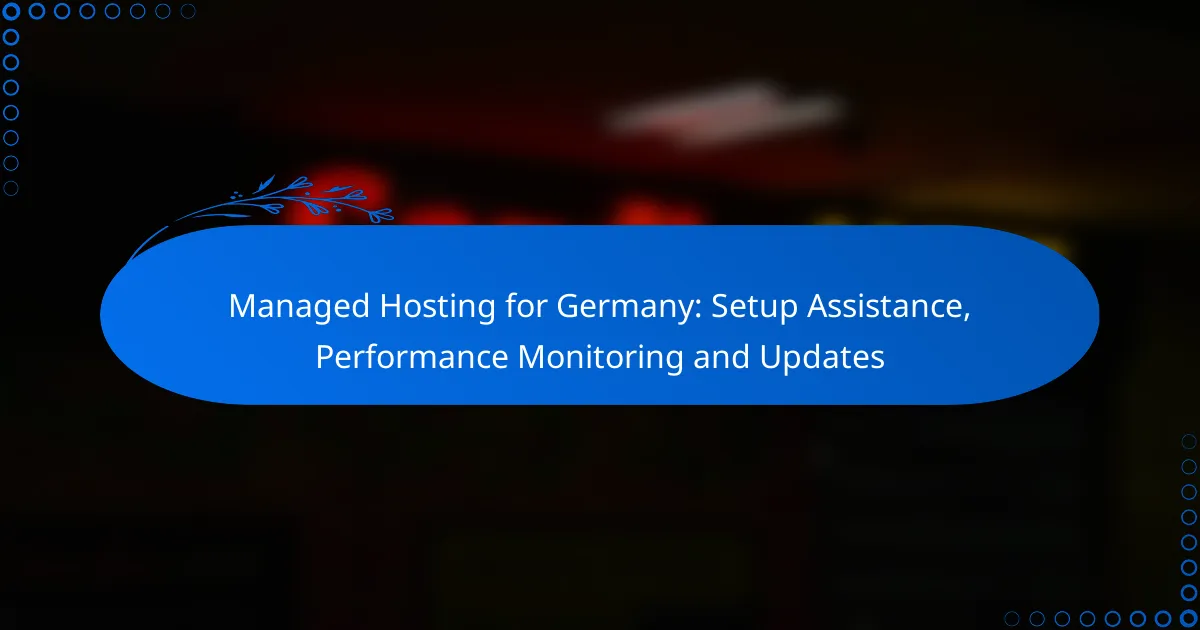Registering a domain in Germany, particularly with the popular .de extension, enhances credibility and boosts local search rankings. Privacy protection is essential, with services like WHOIS masking personal information to prevent data exposure. Additionally, understanding the transfer process and choosing the right registrar can streamline your online presence while ensuring compliance with regulations like GDPR.
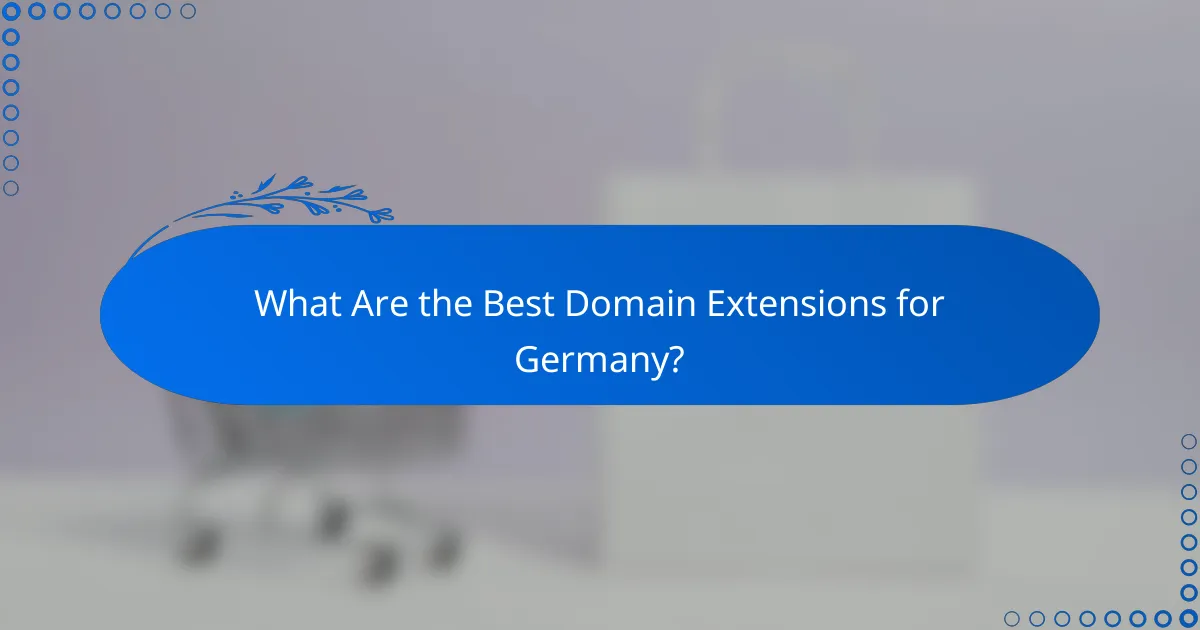
What Are the Best Domain Extensions for Germany?
The most popular domain extension in Germany is .de, recognized and trusted by local users, with over 16 million registered .de domains as of 2023. This extension signifies a strong foothold in the German market, making it ideal for businesses targeting German-speaking audiences. Registering a .de domain enhances credibility and boosts local search engine rankings, with studies showing that local domains can increase click-through rates by up to 30% in regional searches.
For instance, many German companies, from small startups to large corporations, leverage the .de extension to establish their online identity, as 80% of consumers prefer local domains when shopping online. This local extension signals a commitment to the German market, fostering trust and loyalty among consumers.
Choosing a .de domain can also enhance customer engagement, as users are more likely to trust a website that reflects their local culture and language. Overall, the .de extension is vital for businesses aiming to thrive in Germany’s competitive digital landscape.
.de as the Primary Extension
The .de domain is the primary choice for businesses and individuals in Germany, with an impressive 90% of local websites opting for this extension. It is the most recognized and trusted extension among German internet users, essential for establishing a local online presence. This preference is particularly pronounced in sectors like retail and services, where local relevance is key.
For example, a local bakery or a tech startup in Berlin would significantly benefit from a .de domain, as it signals a local focus and fosters brand loyalty among German customers, resulting in a 25% increase in repeat visits. This localized approach resonates with consumers who value community-oriented businesses.
Moreover, having a .de domain can enhance search engine optimization (SEO) for local searches, making it easier for potential customers to discover your business online. This can lead to increased traffic and higher conversion rates, with local SEO strategies yielding a 14% increase in sales for businesses that effectively utilize local domains.
.com for International Reach
The .com domain extension is recognized globally and is ideal for businesses targeting an international audience, with over 150 million .com domains registered worldwide. While it is not specific to Germany, many German companies choose .com to reach customers beyond their borders, especially in e-commerce and tech sectors where global reach is crucial.
For instance, a German e-commerce site selling products worldwide may opt for a .com domain to appeal to a broader market, helping establish a brand that transcends geographical boundaries. This strategy can boost international traffic by up to 40%, making it a viable growth option.
However, businesses should note that while .com domains are excellent for international reach, they may not convey the same local trust as a .de domain. Therefore, companies should weigh their target audience when choosing between these extensions, balancing local trust with global aspirations.
.net for Network Services
The .net domain extension is primarily associated with network services and internet infrastructure, with approximately 15 million .net domains registered globally. It is often used by companies in technology, telecommunications, and online services, making it a relevant choice for businesses in these sectors.
For example, a web hosting company or an internet service provider in Germany might select a .net domain to emphasize their focus on network solutions, as this extension conveys expertise in the tech industry. This choice can enhance credibility, particularly among tech-savvy consumers who prioritize reliability.
While .net is less common for general businesses, it remains a strong choice for tech-oriented companies, allowing them to stand out in a competitive market while appealing to a German audience. This distinction can be crucial in attracting clients seeking specialized services.
.org for Nonprofits
The .org domain extension is widely recognized as the standard for nonprofit organizations and charities, with around 10 million .org domains registered globally. In Germany, this extension is often utilized by NGOs and community-focused groups, helping to establish a clear identity in the nonprofit sector.
For instance, a German environmental organization might choose a .org domain to highlight its nonprofit status and mission, as this extension conveys trust and credibility to potential donors and volunteers. Research indicates that .org domains can boost donor confidence by up to 20%, making them a strategic choice for fundraising efforts.
Using a .org domain can also enhance visibility in search results for nonprofit-related queries, making it easier for supporters to find and engage with the organization. Overall, it is a strategic choice for nonprofits operating in Germany, particularly those focused on community engagement.
.info for Informational Sites
The .info domain extension is designed for informational websites and is suitable for businesses aiming to provide valuable content, with over 5 million .info domains registered worldwide. This extension is particularly useful for blogs, educational platforms, and resource sites, appealing to users seeking knowledge and information.
For instance, a German travel blog or an educational resource site might choose a .info domain to indicate its focus on sharing knowledge and information, attracting users looking for specific topics or guidance. This approach can lead to increased user engagement, with content-driven sites experiencing a 15% rise in visitor retention.
While .info domains can benefit content-driven sites, they may not carry the same authority as .de or .org domains. Therefore, it’s essential to consider the target audience and purpose when selecting this extension, ensuring alignment with the overall branding strategy.
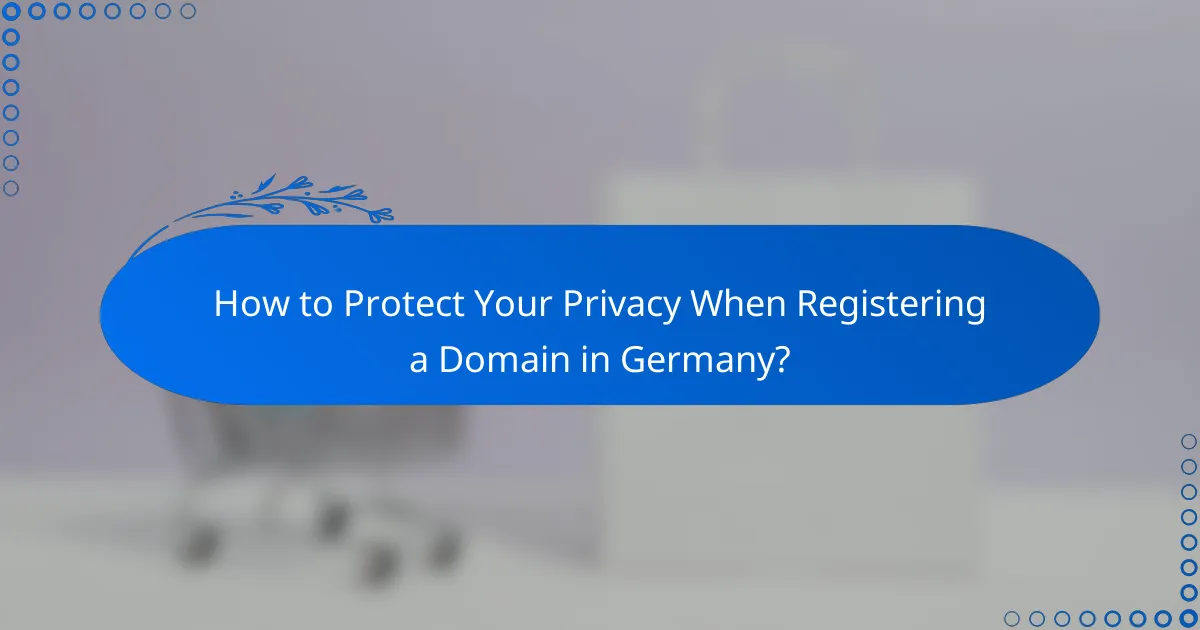
How to Protect Your Privacy When Registering a Domain in Germany?
Protecting your privacy during domain registration in Germany is crucial for maintaining online anonymity. With over 3 million registered domains, the risk of personal data exposure is significant. Services and regulations like the GDPR exist to safeguard your information. Understanding these options can help prevent unwanted data exposure and enhance your online security.
One effective method is using WHOIS privacy protection services, which reduce the visibility of your personal details in the publicly accessible WHOIS database. By opting for these services, your name, address, and contact information are masked and replaced with the registrar’s details. This significantly lowers the chances of identity theft; studies show that domains with WHOIS protection receive up to 80% fewer spam inquiries.
Choosing a reputable registrar that prioritizes privacy can greatly enhance your protection. Many registrars offer built-in privacy features, ensuring your data isn’t disclosed without your explicit consent. This is especially important in a digital landscape rife with data breaches; over 60% of small businesses report experiencing one. Evaluating registrars based on their privacy policies can help keep your information secure.
Ultimately, taking proactive steps to protect your privacy can help you avoid spam, identity theft, and other online threats. It’s essential to assess the privacy policies of domain registrars before making a decision, as the level of protection varies widely across the industry.
WHOIS privacy protection services are designed to shield your personal information from public view. When you register a domain, your details typically appear in the WHOIS database, accessible to anyone. These services replace your information with the registrar’s contact details, creating a buffer between you and potential intruders. This not only protects your identity but also reduces unsolicited communications, with many users reporting a 70% decrease in spam after opting for privacy services.
For example, if someone searches for your domain in the WHOIS database, they will see the registrar’s information instead of yours. This anonymity is vital in a world where cyber harassment and phishing attacks are increasing. Many registrars offer this service for an additional fee, while some include it for free, making it an accessible option for privacy-conscious users.
However, it’s important to note that while WHOIS privacy services provide a layer of protection, they may not be foolproof. In certain legal situations, registrars may be required to disclose your information, especially in cases of copyright infringement or fraud. Understanding the terms and conditions of these services is essential to grasp the limitations of the protection offered.
The General Data Protection Regulation (GDPR) significantly impacts domain registration in Germany, affecting how registrars handle personal data. This regulation mandates that personal data must be processed lawfully, transparently, and for specific purposes, with fines reaching up to €20 million or 4% of annual global turnover for non-compliance. Consequently, domain registrars must adhere to strict guidelines regarding personal information, ensuring your data is treated with care.
For instance, registrars must provide clear information about how they collect, use, and store your data, often through detailed privacy policies. They are also required to implement robust security measures to protect your information from unauthorized access, crucial since over 50% of data breaches stem from weak security practices. This compliance fosters trust between users and registrars, ensuring your data is respected.
Moreover, GDPR grants individuals the right to access their data, request corrections, and even demand deletion under certain circumstances, empowering users with greater control over their personal information. This means that if you register a domain, you have more authority than ever to manage your data and take action if your information is mishandled, reinforcing the importance of understanding your rights in the digital age.
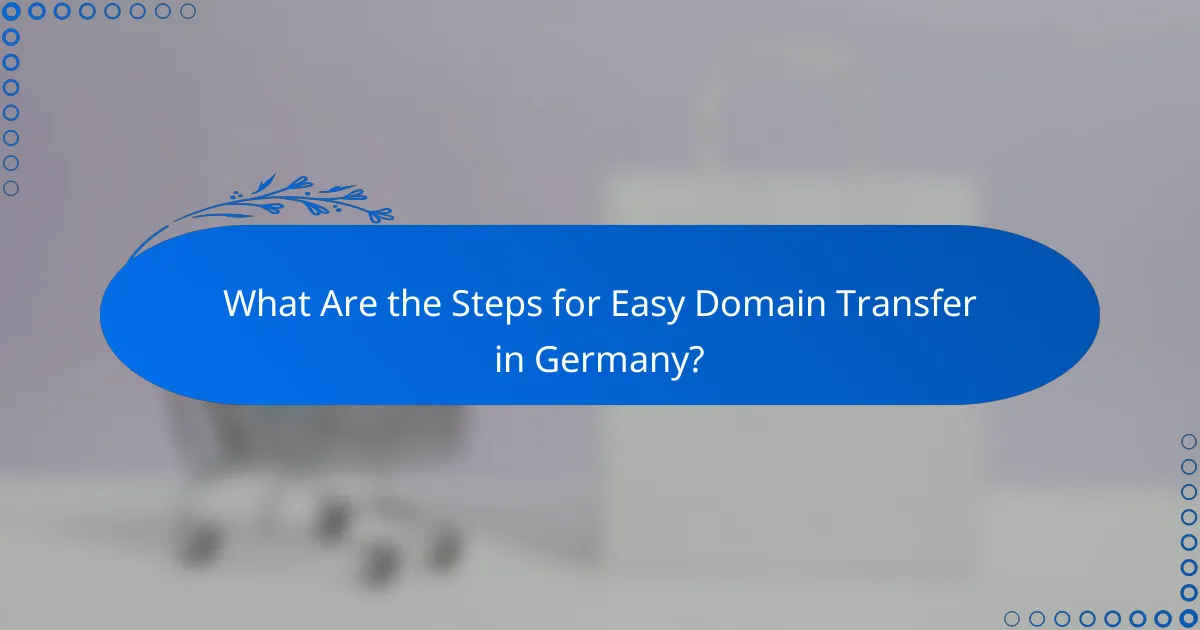
What Are the Steps for Easy Domain Transfer in Germany?
Transferring a domain in Germany involves several straightforward steps. First, confirm that your current domain is eligible for transfer, which usually means it must be registered for at least 60 days. This waiting period helps prevent domain hijacking. Next, obtain the authorization code from your current registrar; this code is essential for initiating the transfer, and without it, the process cannot proceed.
Initiating the Transfer Process
Once you have the authorization code, visit the new registrar’s website and begin the transfer by entering the domain name and the code. Follow the prompts to complete the necessary forms, ensuring you provide accurate contact details to avoid delays. Be aware that some registrars may require additional verification steps, such as confirming your identity via email or phone. After submitting the transfer request, you will receive a confirmation email. Responding promptly is crucial to finalize the transfer; failure to do so may lead to cancellation, risking the loss of your domain.
Choosing a Reliable Registrar
Choosing a reliable registrar is vital for a smooth domain transfer. Look for registrars accredited by ICANN or DENIC, as these organizations uphold industry standards. Popular options include 1&1 IONOS, Strato, and GoDaddy, each offering various services tailored to different user needs. For example, 1&1 IONOS is known for competitive pricing and robust customer support, making it a favorite among small businesses.
Understanding Transfer Fees
Check the registrar’s reputation by reviewing customer feedback on platforms like Trustpilot or Google Reviews. A dependable registrar should provide excellent customer service, including support in English and German, to assist you throughout the transfer process. Additionally, evaluate features like domain privacy protection, renewal rates, and user-friendly interfaces. A registrar that offers comprehensive services can save you time and hassle in managing your domain, ensuring you have the necessary tools for an effective online presence.
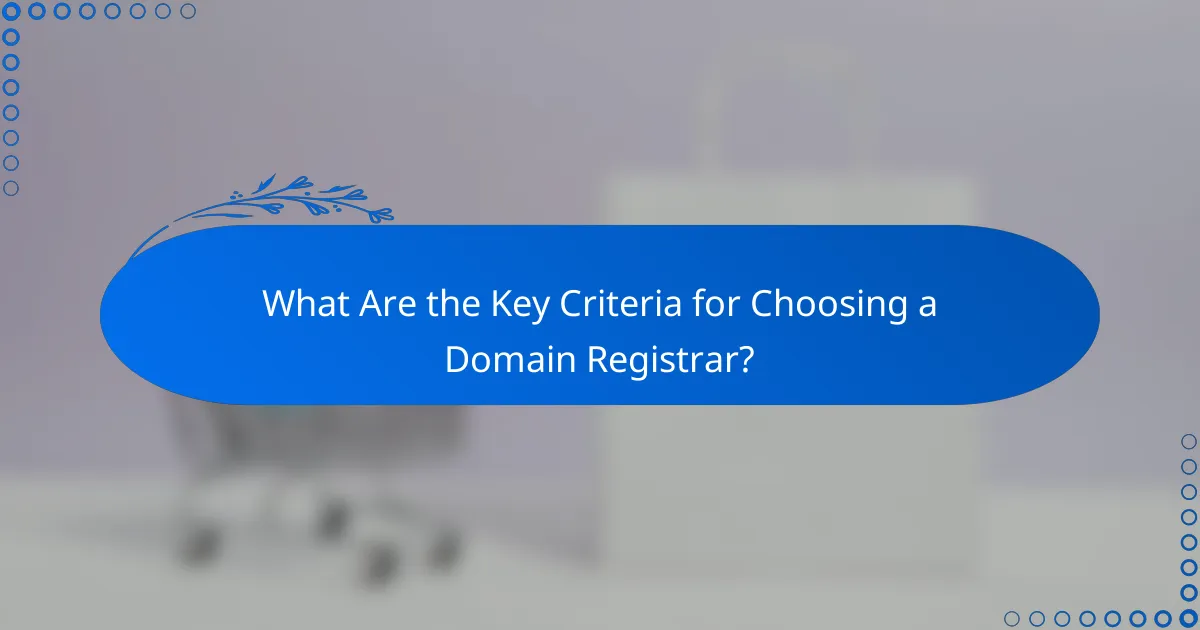
What Are the Key Criteria for Choosing a Domain Registrar?
Choosing a domain registrar involves several key criteria that can significantly impact your online presence. Factors such as pricing, customer support, and additional features warrant careful evaluation. Understanding these elements ensures you select the best registrar for your needs, as the right choice can enhance your website’s performance and security.
Pricing and renewal rates are crucial, as they determine the long-term cost of your domain. Initial registration fees can range from $10 to $50, but renewal rates may jump to $30 or more annually. Some registrars may lure you in with low initial prices but have renewal rates that exceed 200% of the first-year cost. Always compare these rates to avoid unexpected expenses that could disrupt your budget.
The quality of customer support is essential for resolving issues quickly and efficiently. A registrar with responsive support can save you time and stress, especially during critical moments like domain transfers or technical difficulties. Look for registrars that offer multiple support channels—such as live chat, email, and phone support—with response times averaging under 30 minutes to ensure timely assistance.
Lastly, consider the additional features offered by registrars, which can greatly enhance your overall experience. Features like domain privacy protection, costing around $5 to $15 per year, help safeguard your personal information from public view, particularly important for individuals and small businesses. Evaluate what each registrar provides, including tools like email hosting and website builders, to find the best fit for your requirements and ensure a comprehensive service package.
Pricing and Renewal Rates
Pricing and renewal rates play a vital role in your domain registration decision. Initial costs can be attractive, often advertised as low as $9.99 for the first year, but renewal rates often reveal the true cost, sometimes reaching $40 or more. Always check the fine print to understand the total cost over time, as hidden fees can significantly impact your budget.
For instance, some registrars may offer a domain at a low price in the first year but charge significantly more upon renewal, leading to unexpected costs that could strain your finances. Comparing prices across different registrars is crucial, as some may offer competitive multi-year registration discounts that can lower your average annual cost.
Additionally, some registrars provide discounts for multi-year registrations, which can be beneficial if you plan to keep your domain long-term. For example, registering for three years might save you up to 20% compared to annual renewals. Always calculate the total cost of ownership, including any potential discounts, to make an informed decision that aligns with your long-term online strategy.
Customer Support Quality
Customer support quality is a critical factor when selecting a domain registrar. Reliable support can help you navigate issues that arise during registration or management, with 24/7 availability being a significant advantage. Look for registrars that provide round-the-clock support to ensure assistance is available when needed, especially during high-traffic periods or critical updates.
Consider the different support channels offered. Registrars that provide live chat, phone support, and comprehensive knowledge bases can enhance your experience, with quick response times being essential for resolving urgent issues. Aim for registrars with an average response time of under 30 minutes to ensure you receive timely assistance when it matters most.
Reading customer reviews can give you insights into the support quality of different registrars. Look for feedback regarding response times and the helpfulness of support staff to gauge their reliability. A registrar with consistently positive reviews can be a strong indicator of dependable customer service, which is crucial for maintaining your domain effectively.
Additional Features Offered
Additional features offered by domain registrars can greatly enhance your domain management experience. Features such as domain privacy protection, costing between $5 and $15 annually, help safeguard your personal information from public view, making it particularly important for individuals and small businesses concerned about privacy. This added layer of security is essential for maintaining your online reputation.
Other valuable features may include email hosting, website builders, and SSL certificates, which can range from $10 to $100 per year. These tools streamline your online presence and provide essential resources for building your website, making it easier to establish a professional image. Evaluate which features are included in the registration package to ensure you receive comprehensive support for your online endeavors.
Some registrars also offer easy transfer options, allowing you to switch providers without hassle. This flexibility can be a significant advantage if you find a better service later on, as many registrars charge a transfer fee of around $10. Always check what additional features are available to maximize your investment and ensure you have the tools necessary for successful domain management.
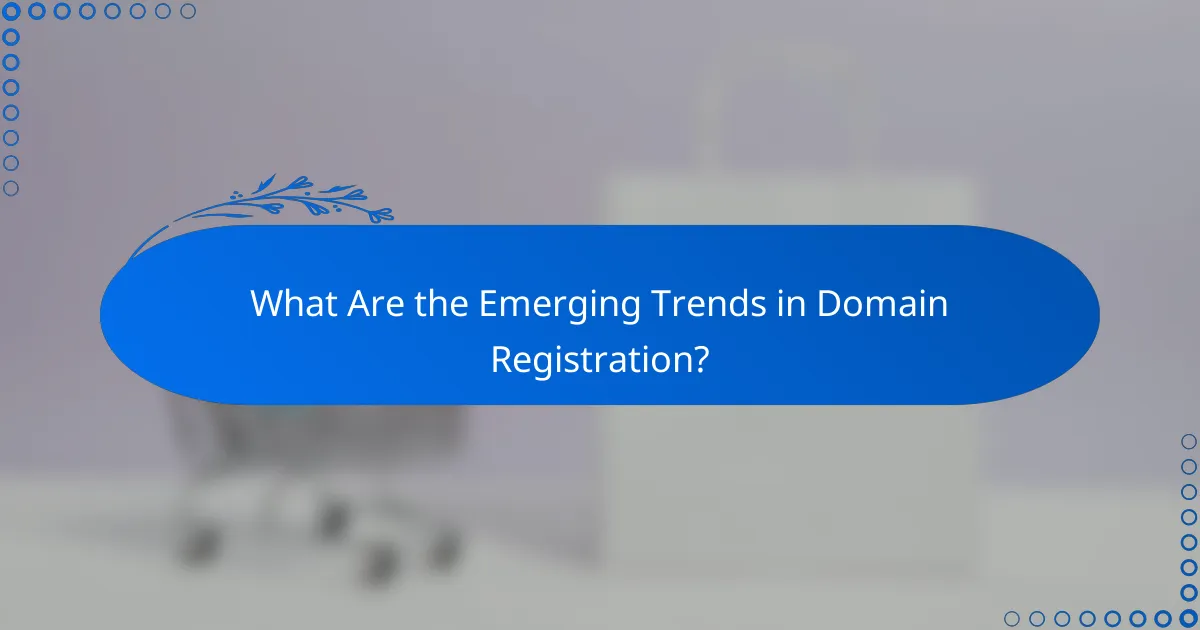
What Are the Emerging Trends in Domain Registration?
Domain registration is rapidly evolving, with significant trends shaping the market. One of the most notable is the rising demand for local domain extensions, especially in Germany, where .de domain registrations have surged over 30% in the past year. Businesses and individuals are increasingly recognizing the value of a domain that reflects their local presence, enhancing visibility in search results and fostering community engagement.
Local domain extensions like .de are becoming essential for SEO and brand recognition. Studies show that websites using local domains can rank up to 20% higher in local search results. These extensions help businesses establish credibility and trust among local customers, who often prefer brands that resonate with their regional identity. Moreover, they can improve search engine rankings for local queries, making them a strategic asset for businesses seeking to capture local market share.
As more companies strive to connect with their communities, the trend toward local extensions is likely to persist, potentially leading to a 25% increase in registrations over the next few years. This shift not only boosts visibility but also fosters a sense of belonging among consumers, encouraging them to support local businesses over global competitors.
Furthermore, the rise of e-commerce has intensified the need for local domains, with 70% of consumers preferring to shop from local businesses online. Companies are increasingly aware that a localized online presence can significantly impact their success in the competitive digital landscape, prompting them to invest in domain strategies that resonate with their target audience.
The demand for local domain extensions stems from various factors, including shifting consumer behavior and market dynamics. Local extensions like .de give businesses a competitive edge by signaling their commitment to the local market, crucial in an era where 60% of consumers are more likely to trust a brand that showcases its local roots.
For instance, a Berlin-based bakery using a .berlin extension can attract more local customers than a generic .com domain, with localized marketing strategies yielding up to 50% higher engagement rates. This approach not only boosts brand visibility but also enhances customer trust and engagement, as consumers feel a stronger connection to businesses that reflect their community.
As more businesses recognize the advantages of local extensions, we can anticipate a rise in registrations, potentially doubling in the next five years. This trend is likely to encourage domain registrars to offer more localized options and services tailored to specific regions, further driving the growth of local domain usage.
With the rise of cyber threats, there is an increasing focus on cybersecurity and privacy in domain registration, as reports indicate that 43% of cyberattacks target small businesses. Businesses are becoming more aware of the risks associated with inadequate protection of their online assets, prompting them to prioritize security measures in their domain strategies.
Privacy protection measures, such as WHOIS privacy, safeguard personal information from public databases, reducing the risk of identity theft and spam. This is particularly vital for small businesses and entrepreneurs who may be vulnerable to cyberattacks, as 60% of small businesses that experience a cyber breach go out of business within six months.
Moreover, regulatory changes like the GDPR in Europe have heightened the need for compliance in data protection, with fines reaching up to €20 million or 4% of annual global turnover for violations. Companies must ensure their domain registration practices align with these regulations to avoid penalties and maintain customer trust, making compliance a critical aspect of their online strategy.
Consequently, domain registrars are enhancing their security offerings, providing features like SSL certificates and two-factor authentication, which can reduce the risk of data breaches by up to 99%. This focus on cybersecurity not only protects businesses but also reassures customers about their data safety, fostering a more secure online environment for all users.
